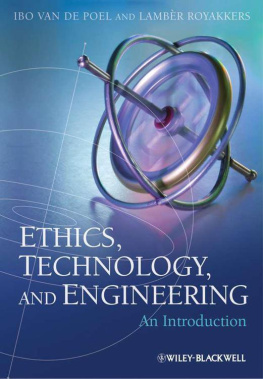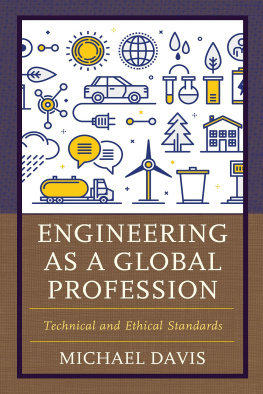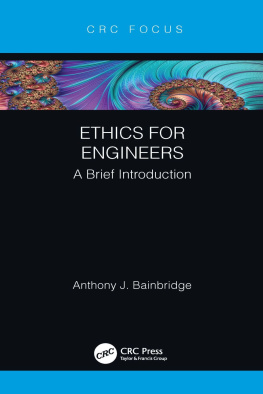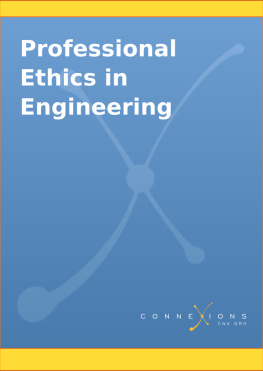Contents
Peter-Paul Verbeek
Michiel Brumsen

This edition first published 2011
2011 Ibo van de Poel and Lambr Royakkers
chapter 7: Peter-Paul Verbeek; chapter 10: Michiel Brumsen
Blackwell Publishing was acquired by John Wiley & Sons in February 2007. Blackwells publishing program has been merged with Wileys global Scientific, Technical, and Medical business to form Wiley-Blackwell.
Registered Office
John Wiley & Sons Ltd, The Atrium, Southern Gate, Chichester, West Sussex, PO19 8SQ, United Kingdom
Editorial Offices
350 Main Street, Malden, MA 02148-5020, USA
9600 Garsington Road, Oxford, OX4 2DQ, UK
The Atrium, Southern Gate, Chichester, West Sussex, PO19 8SQ, UK
For details of our global editorial offices, for customer services, and for information about how to apply for permission to reuse the copyright material in this book please see our website at www.wiley.com/wiley-blackwell.
The right of Ibo van de Poel and Lambr Royakkers to be identified as the authors of this work has been asserted in accordance with the UK Copyright, Designs and Patents Act 1988.
All rights reserved. No part of this publication may be reproduced, stored in a retrieval system, or transmitted, in any form or by any means, electronic, mechanical, photocopying, recording or otherwise, except as permitted by the UK Copyright, Designs and Patents Act 1988, without the prior permission of the publisher.
Wiley also publishes its books in a variety of electronic formats. Some content that appears in print may not be available in electronic books.
Designations used by companies to distinguish their products are often claimed as trademarks. All brand names and product names used in this book are trade names, service marks, trademarks or registered trademarks of their respective owners. The publisher is not associated with any product or vendor mentioned in this book. This publication is designed to provide accurate and authoritative information in regard to the subject matter covered. It is sold on the understanding that the publisher is not engaged in rendering professional services. If professional advice or other expert assistance is required, the services of a competent professional should be sought.
Library of Congress Cataloging-in-Publication Data
Poel, Ibo van de, 1966
Ethics, Technology, and Engineering : An Introduction / by Ibo van de Poel and Lambr Royakkers.
p. cm.
Includes bibliographical references and index.
ISBN 978-1-4443-3094-6 (hardcover : alk. paper) ISBN 978-1-4443-3095-3 (pbk. : alk. paper) 1. TechnologyMoral and ethical aspects. I. Royakkers, Lambr M. M. II. Title.
BJ59.P63 2011
174.96dc22
2010042204
A catalogue record for this book is available from the British Library.
This book is published in the following electronic formats: eBook 978-1-4443-9570-9;
ePub 978-1-4443-9571-6
1 2011
Acknowledgments
This book is based on our Dutch text book Royakkers, L., van de Poel, I. and Pieters, A. (eds) (2004). Ethiek & techniek. Morele overwegingen in de ingenieurspraktijk, HBuitgevers, Baarn. Most of the chapters have been thoroughly revised. Some chapters from the Dutch text book are not included and this book contains some new chapters.
Section 1.4 contains excerpts from Van de Poel, Ibo. 2007. De vermeende neutraliteit van techniek. De professionele idealen van ingenieurs, in Werkzame idealen. Ethische reflecties op professionaliteit (eds J. Kole and D. de Ruyter), Van Gorcum, Assen, pp. 1123. [translated from Dutch].
Section 3.11 and large parts of Chapter 5 are drawn from Van de Poel, I., and Royakkers, L. (2007). The ethical cycle. Journal of Business Ethics, 71 (1), 113.
Section 6.2.4. contains excerpts from Devon, R. and Van de Poel, I. (2004). Design ethics: The social ethics paradigm. International Journal of Engineering Education, 20 (3), 461469.
Section 6.3 contains excerpts from Van de Poel, I. (2009). Values in engineering design, in Handbook of the Philosophy of Science. Vol. 9: Philosophy of Technology and Engineering Sciences (ed. A. Meijers), Elsevier, Amsterdam, pp. 9731006.
Chapter 7, which is written by Peter-Paul Verbeek is based on Verbeek, P.P. (2006a). Materializing morality Design ethics and technological mediation. Science, Technology and Human Values, 31 (3), 361380; Verbeek, P.P. (2006b), The morality of things A postphenomenological inquiry, in Postphenomenology: A Critical Companion to Ihde (ed. E. Selinger), State University of New York Press, New York, pp. 117130; and Verbeek, P.P. (2008), Morality in design: Design ethics and the morality of technological artifacts, in Philosophy And Design: From Engineering to Architecture (eds P.E. Vermaas, P. Kroes, A. Light, and S.A. Moore), Springer, Dordrecht, pp. 91103.
Section 8.7 contains excerpts from Van de Poel, I. (2009). The introduction of nan-otechnology as a societal experiment, in Technoscience in Progress. Managing the Uncertainty of Nanotechnology (eds S. Arnaldi, A. Lorenzet and F. Russo), IOS Press, Amsterdam, pp. 129142.
Section 9.2 contains excerpts from van de Poel, I., Fahlquist, J.N., de Lima, T., Doorn, N., Royakkers, L. and Zwart, S. Fairness and completeness in distributing responsibility: The case of engineering. Manuscript.
Introduction
One of the main differences between science and engineering is that engineering is not just about better understanding the world but also about changing it. Many engineers believe that such change improves, or at least should improve, the world. In this sense engineering is an inherently morally motivated activity. Changing the world for the better is, however, no easy task and also not one that can be achieved on the basis of engineering knowledge alone. It also requires, among other things, ethical reflection and knowledge. This book aims at contributing to such reflection and knowledge, not just in a theoretical sense but also more practically.
This book takes an innovative approach to engineering ethics in several respects. It provides a rather unique approach to ethical decision-making: the ethical cycle. This approach is illustrated by an abundance of cases studies and examples, not only from the US but also from Europe and the rest of the world. The book is also innovative in paying more attention than most traditional introductions in engineering ethics to such topics as ethics in engineering design, the organizational context of engineering, the distribution of responsibility, sustainability, and new technologies such as nano-technology.
There is an increasing attention to ethics in the engineering curricula. Engineers are supposed not only to carry out their work competently and skillfully but also to be aware of the broader ethical and social implications of engineering and to be able to reflect on these. According to the Engineering Criteria 2000 of the Accreditation Board for Engineering and Technology (ABET) in the US, engineering graduates must have an understanding of professional and ethical responsibility and the broad education necessary to understand the impact of engineering solutions in a global and societal context (Herkert 1999).
This book provides an undergraduate introduction to ethics in engineering and technology. It helps students to acquire the competences mentioned in the ABET criteria or comparable criteria formulated in other countries. More specifically, this book helps students to acquire the following moral competencies:











